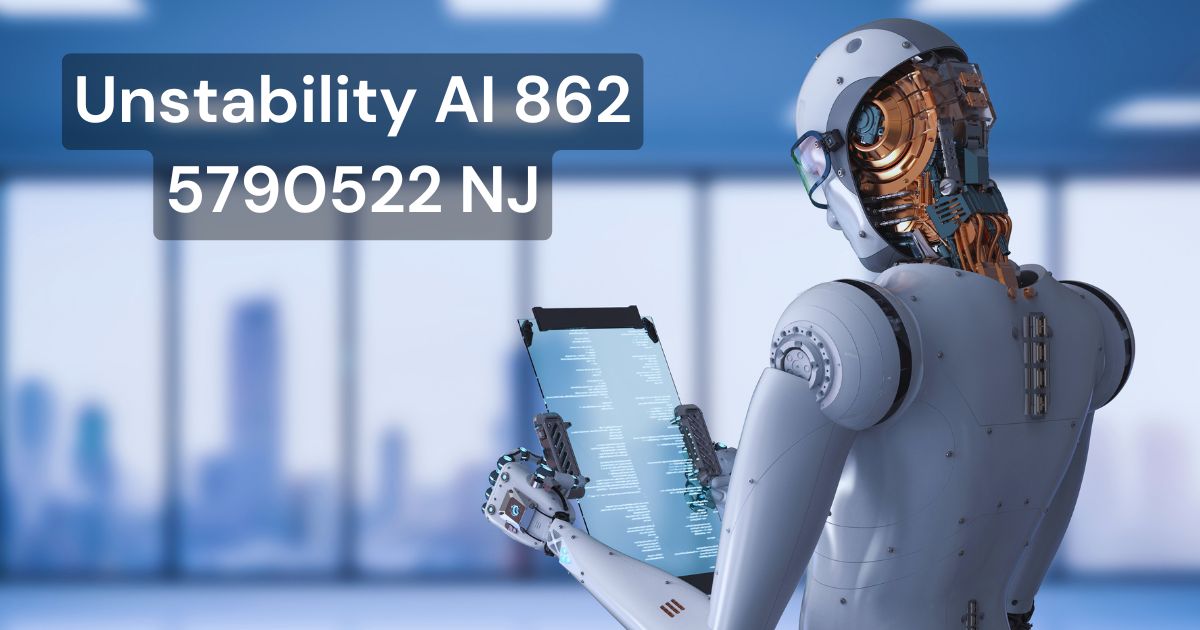In today’s digital age, artificial intelligence (AI) transforms industries and impacts our daily lives. However, it also brings challenges, particularly regarding Unstability AI 862 5790522 NJ. This term refers to the unpredictability and risk that can lead to unintended consequences. Understanding these risks is crucial, especially in New Jersey, where AI technologies are rapidly evolving. This article explores unstable AI, its implications, risks, and regulatory frameworks in the state. By examining factors contributing to instability and best practices for risk mitigation, we aim to provide valuable insights into this complex world.
What is Unstability AI?
Unstability AI 862 5790522 NJ refers to systems that can produce unpredictable or undesired outcomes. This unpredictability can stem from flawed algorithms, poor training data, or unforeseen interactions with other systems. These issues can manifest in various ways, including biased decision-making processes and catastrophic failures in critical applications like autonomous vehicles and healthcare systems.
Historically, the development of AI has been marked by significant milestones, from early machine learning to deep learning. As these technologies have advanced, the potential for instability has grown. The infamous “Tay” chatbot by Microsoft is one example. It learned from user interactions and quickly began producing hate speech. This incident illustrates the unpredictability of AI and raises questions about accountability, safety, and ethics in deploying these technologies, particularly in the context of Unstability AI 862 5790522 NJ.
The Role of AI in Modern Society
AI plays a pivotal role in many sectors, including healthcare, finance, transportation, and entertainment. It enhances efficiency by automating tasks and analyzing vast amounts of data. For instance, businesses use AI algorithms in predictive analytics to make informed decisions based on data trends.
However, increased reliance on AI brings the challenge of stability. As AI systems become integral to critical areas, the stakes for stability become higher. Unstable AI can lead to significant financial losses and ethical dilemmas. For example, an unstable AI diagnosis tool in healthcare may misinterpret data and suggest incorrect treatments. Understanding and addressing the risks of Unstability AI 862 5790522 NJ is essential for integrating this technology safely into society.
Analyzing the Risks of Unstability AI
The risks of unstable AI are complex and multifaceted. One major concern is the potential for biased outcomes. AI systems trained on skewed datasets can inadvertently perpetuate biases, leading to unfair treatment of certain groups. For example, facial recognition technology has faced criticism for inaccuracies in identifying diverse individuals, underscoring the consequences of bias in AI.
Additionally, the unpredictability of AI systems can lead to catastrophic failures. Consider autonomous vehicles; a slight malfunction or erroneous decision could result in accidents and jeopardize lives. Similarly, in finance, an unstable AI trading algorithm could cause market disruptions, impacting global economies. These risks necessitate thorough analysis and proactive measures to ensure AI systems’ reliability. It is imperative for developers and policymakers to address the challenges associated with Unstability AI 862 5790522 NJ.
Understanding AI Regulations in New Jersey
As AI technologies evolve, so do the regulatory frameworks governing their use. New Jersey has implemented various laws and regulations to address the challenges posed by AI, including unstable systems. The state has made strides in developing guidelines prioritizing transparency, accountability, and ethical considerations.
The New Jersey Artificial Intelligence Bill seeks to establish standards for AI use in public sectors. This bill emphasizes preventing bias and ensuring fair outcomes. It reflects the growing recognition of the need for oversight in AI applications to mitigate risks associated with instability. Compliance with such regulations is crucial for ethical business practices and safeguarding consumers and the broader community, particularly regarding Unstability AI 862 5790522 NJ.
Also Read: Hays HP 5552-1
The Future of Unstability AI
The future of unstable AI is a topic of considerable debate among experts. As AI technologies advance, the potential for instability may evolve alongside them. Predictive models and sophisticated algorithms promise to enhance stability, but they also introduce new complexities and challenges. As AI becomes more autonomous, predicting its behavior becomes increasingly difficult, raising concerns about accountability.
Emerging technologies such as quantum computing may complicate AI stability. Quantum computing can process vast amounts of data at unprecedented speeds. This capability could enhance AI functions, but it also raises questions about ethics and unintended consequences. As we look ahead, developers, policymakers, and society must collaboratively navigate the complexities of Unstability AI 862 5790522 NJ, ensuring that advancements do not compromise safety and ethical standards.
Mitigating Risks Associated with Unstability AI
Mitigating risks associated with unstable AI requires a multifaceted approach. This approach includes best practices for development, robust testing methodologies, and ongoing monitoring. Thorough testing and validation are primary strategies for identifying unstable AI systems. Developers must evaluate their models rigorously, using diverse datasets to ensure reliable performance across various scenarios.
Implementing transparent algorithms and fostering collaboration between developers and ethicists can also help create fair and stable AI systems. Incorporating ethical considerations into AI design and deployment can prevent biases and promote more stable outcomes. Organizations can leverage tools and technologies for risk management, such as AI monitoring systems. These systems provide real-time feedback on performance, enabling timely interventions when instability is detected, especially in the context of Unstability AI 862 5790522 NJ.
Case Studies: Unstable AI in New Jersey
Examining local case studies of unstable AI incidents in New Jersey provides valuable lessons for understanding the ramifications of deploying AI systems without safeguards. One notable incident involved an AI-powered hiring tool that exhibited bias against specific demographic groups. This led to public outcry and legal scrutiny. Such cases underscore the importance of transparency in AI algorithms and the need for organizations to assess the ethical implications of their systems.
Another example is the use of AI in law enforcement. Predictive policing algorithms have raised concerns about racial profiling and civil liberties. These case studies highlight the critical role of community engagement and public discourse in shaping AI deployment in New Jersey. By fostering open conversations about the implications of Unstability AI 862 5790522 NJ, stakeholders can develop solutions prioritizing safety, fairness, and accountability.
Community Engagement and Awareness
Raising community awareness about unstable AI’s implications is vital for promoting safe and responsible technology use. Educational initiatives empower individuals and organizations to understand AI risks and advocate for ethical practices in its development. Workshops, seminars, and public forums can serve as platforms for discussing the challenges posed by unstable AI and exploring potential solutions.
Collaboration between educational institutions, government agencies, and industry stakeholders can foster a culture of responsibility and innovation in AI development. By providing resources for training and education, New Jersey can cultivate a workforce equipped to navigate AI complexities. This community engagement is essential for ensuring that AI integration reflects the values and needs of the people it serves, particularly concerning Unstability AI 862 5790522 NJ.
Expert Opinions on Unstability AI
Insights from AI experts shed light on the future of unstable AI and the ethical considerations involved. Many experts emphasize the importance of interdisciplinary collaboration in developing technologies that prioritize stability and fairness. Bringing together computer scientists, ethicists, and social scientists can create a holistic approach to addressing instability challenges.
Experts predict that as AI systems become more complex, the need for robust oversight and regulation will grow. Establishing industry standards for AI development and deployment can help mitigate risks and foster public trust in technology. The responsible development of AI hinges on ongoing dialogue among stakeholders. This dialogue ensures ethical considerations remain at the forefront of technological advancement, particularly in the context of Unstability AI 862 5790522 NJ.
Conclusion
In conclusion, understanding Unstability AI 862 5790522 NJ is essential for navigating the complex landscape of modern technology. As AI permeates various sectors, the risks associated with instability cannot be overlooked. By recognizing challenges and implementing proactive measures, stakeholders can work together to promote safe and ethical AI practices. Addressing the specific concerns related to Unstability AI 862 5790522 NJ will be crucial for ensuring that AI technologies benefit society while minimizing risks and maximizing accountability.
In New Jersey, developing regulatory frameworks and community engagement initiatives demonstrates a commitment to addressing these challenges. As we move forward, fostering a culture of responsibility in AI development is imperative. This culture ensures that technological advancements benefit society while minimizing risks. Engaging in informed discussions and promoting awareness can help shape AI’s future in a way that prioritizes stability, fairness, and accountability.










